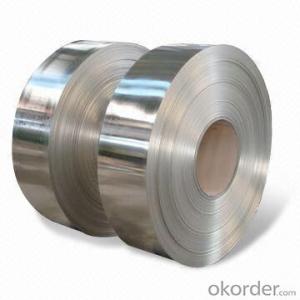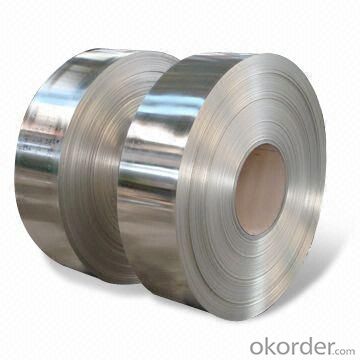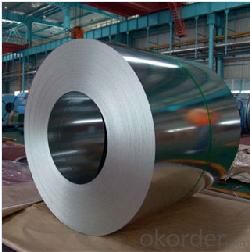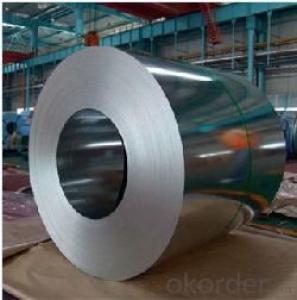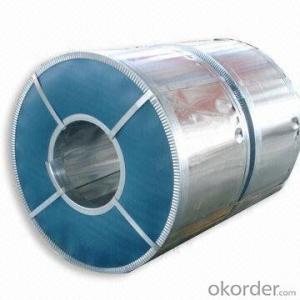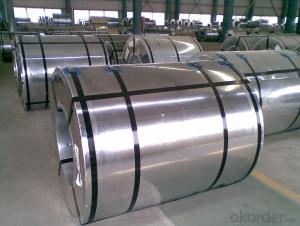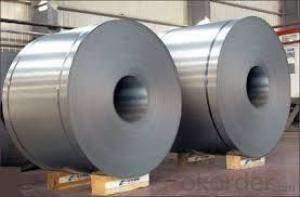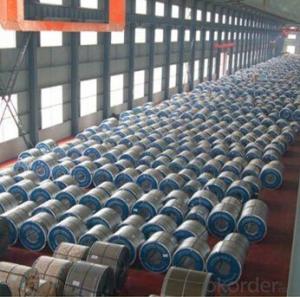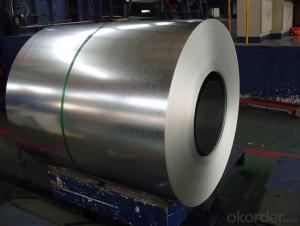Hot Dipped Galvanized Steel Coils Z60-Z450
- Loading Port:
- Shanghai
- Payment Terms:
- TT OR LC
- Min Order Qty:
- 25 m.t.
- Supply Capability:
- 10000 m.t./month
OKorder Service Pledge
OKorder Financial Service
You Might Also Like
Quick Details
| Standard: | ASTM, GB, JIS | Grade: | SGCC. SGCH. DX51D+Z. JIS G3302 | Thickness: | 0.15mm-5.0mm |
| Place of Origin: | China (Mainland) | Brand Name: | CNBM | Type: | Steel Coil |
| Technique: | Cold Rolled | Surface Treatment: | Galvanized | Application: | Roofing sheet and PPGI Base and Building Materials |
| Special Use: | High-strength Steel Plate | Width: | 600mm-1250mm | Length: | Customized |
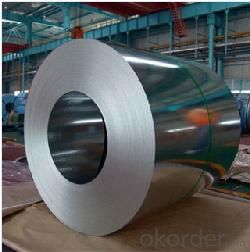
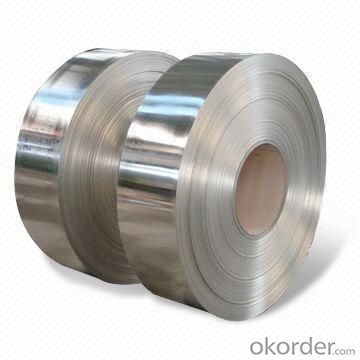
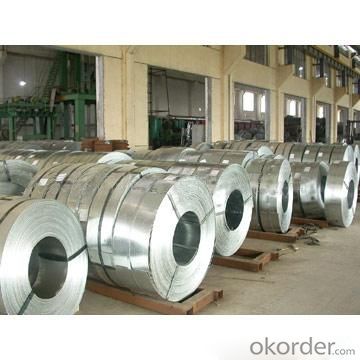
Specifications:
Thickness: 0.13mm TCT up to 5.0mm TCT.
Width: 600mm up to 1250mm.
Zinc Coating: 40-450G/M2.
Chromated, Dry, Skin-passed, Tension Level, Shining. Oiled or Unoiled.
Regular Spangle, minimum Spangle, Large Spangle, Zero Spangle.
Temper: Full Hard (85-95 HRB; G550). Commercial Quality (50-75 HRB; G350).
Coil Weight: 3-6 MT.
Coil ID: 508mm or 610mm.
Shipment: By Bulk or By 20GP Container.
Waterproof Standard Export Packing.
Payment Terms: by T/T or L/C at Sight.
Delivery: 30 Days.
FAQ
We have organized several common questions for our clients,may help you sincerely:
1)How to guarantee the quality of the products?
We have established the international advanced quality management system,every link from raw material to final product we have strict quality test;We resolutely put an end to unqualified products flowing into the market. At the same time, we will provide necessary follow-up service assurance.
2)How long can we receive the product after purchase?
In the purchase of product within 20-25 days, we will arrange the factory delivery as soon as possible. The pacific time of receiving is related to the state and position of customers. Commonly 15 to 30 days can be served.
3)Do you have necessary certificate or inspection to make sure we can import smoothly?
Syringes are CE,FDA approved. And we supplied main nations in the world.
- Q: What is the maximum temperature that steel coils can withstand?
- The maximum temperature that steel coils can withstand depends on the specific type of steel being used. However, generally, steel coils can withstand temperatures up to around 1,500 degrees Fahrenheit (815 degrees Celsius) before they begin to lose their structural integrity and strength.
- Q: What is the lifespan of steel coils?
- The lifespan of steel coils can vary depending on various factors such as the quality of the steel, the environment it is exposed to, and how well it is maintained. However, on average, steel coils can last anywhere from 10 to 30 years.
- Q: What are the different coil packaging materials used for steel coils?
- There are several different coil packaging materials used for steel coils, each offering unique properties and benefits. Some of the most common materials include: 1. Stretch film: This is a popular choice for coil packaging due to its excellent flexibility and ability to tightly wrap around the coil. Stretch film provides good protection against dust, moisture, and scratches. 2. Steel strapping: Steel strapping is a robust and durable option for securing steel coils. It offers high tensile strength and resistance to breakage, ensuring the coils remain tightly bound during transport or storage. 3. Plastic strapping: Plastic strapping is a lightweight and cost-effective alternative to steel strapping. It offers good shock absorption and is resistant to rust and corrosion. Plastic strapping is often used for smaller or lighter steel coils. 4. Paperboard: Paperboard is a recyclable and eco-friendly packaging material. It provides a protective layer against dust and minor impacts, while also allowing slight breathability to prevent moisture buildup. 5. Wooden crates: Wooden crates are commonly used for large or heavy steel coils. They offer sturdy support and protection, preventing any damage during handling, transportation, or storage. 6. Corrugated cardboard: Corrugated cardboard is a versatile and lightweight packaging material suitable for smaller steel coils. It provides cushioning and protection against minor impacts, as well as being easily recyclable. The choice of coil packaging material depends on various factors such as the size and weight of the steel coils, transportation requirements, and desired level of protection. Each material has its own advantages and should be selected based on the specific needs of the steel coil packaging.
- Q: Is it just because brass is reloadable? But what makes it reloadable? What does brass bring to the equation that the steel cased ammo can't do?
- When 9mm was short I bought some steel Tula ammo, it was cheap and available. When at the range I was shooting it and it sounded different and felt different, way less kick. So I loaded up a mix of Tula and some Federal. Big difference between them. I also had failure to eject on the steel, then put brass in and did not have that problem. I do not buy cheap steel ammo anymore.
- Q: Im getting a new guitar soon, and it has steel strings. ive heard that nilon strings are better? thanks:)
- Classical okorder /... P.S Classical guitars are not limited to playing classical music but that is generally what they are used for.
- Q: Are steel coils used in construction?
- Yes, steel coils are commonly used in construction. They are used for various applications such as structural framing, roofing, walls, and other components in buildings and infrastructure projects. Steel coils provide strength, durability, and flexibility, making them a popular choice in construction.
- Q: i would like to know of any companies who buy shredded scrap steel
- We are one of the biggest steel mills in Asia. Under our group, we have steel mills in Thailand and Bangladesh. On the monthly basis, we purchase steel scrap HMS1/2 80:20 and the shredded ISRI210/211, ISRI211 by bulk and 20' container to Thailand and Bangladesh. Due to the limitation of our existing shredded steel scrap supplier, we need to get more supply of the shredded. Please contact us or offer us of ISRI 210/211 or ISRI211 CFR Chittagong, Bangladesh with 500mt - 2000mt per shipment by 20' container. If any questions, please feel free to contact us.
- Q: How are steel coils used in the manufacturing of construction excavators?
- Steel coils are used in the manufacturing of construction excavators as they are the primary material for constructing the structural components, such as the boom, arm, and bucket. These coils are processed into various shapes and sizes through cutting, bending, and welding techniques, and then assembled to create the sturdy and durable framework of the excavator.
- Q: I was wondering what kind of company casts and sells steel without acting as a contractor as well. They only sell steel no install it
- If you are talking about raw steel materials and products I believe you are talking about a steel processor and warehouse company or a steel distributor. There are many different points along the steel manufacturing process that you could buy steel products. It would depend on various factors. Depending the amount, type, grade, gauge, properties, origin and a host of other elements you could purchase the steel in billet, plate, diamond plate, rolled sheet (cold or hot), coil, beam, stamped, pickled, scrapped, etc. You get the idea. Now I don't know where you are in the world, but you can go to one of the two sites below, which I have used for product sourcing and research before. The last one is a major manufacturer that I have actually been to. I hope this helps.
- Q: How are steel coils used in the production of storage racks and shelving?
- Steel coils are a crucial component in the manufacturing process of storage racks and shelving. These coils are typically made from high-quality steel that is rolled into a long, continuous strip. The steel coils are then processed and transformed into various forms, such as sheets or strips, which are used to create the frames, shelves, and other structural components of storage racks and shelving systems. Firstly, the steel coils are unwound and flattened through a series of machines, ensuring uniform thickness and width. This process enables manufacturers to obtain sheets or strips of steel with consistent dimensions, which are essential for the production of storage racks and shelving that need to meet specific design specifications and structural requirements. Once the steel coils are flattened and cut into the desired sizes, they are further processed to add necessary features and characteristics. This can involve bending, punching, or welding the steel to create the desired shapes, such as uprights, beams, or brackets for the storage racks and shelving. These components are then assembled together to form the framework of the storage system. The durability and strength of steel make it an ideal material for storage racks and shelving. Steel coils provide the necessary structural integrity and load-bearing capacity required to support heavy items and withstand the rigors of everyday use. Additionally, steel is resistant to corrosion, which ensures the longevity and reliability of the storage racks and shelving systems. Furthermore, steel coils can be coated or galvanized to enhance their resistance to rust and corrosion. This protective layer helps to maintain the aesthetic appeal and structural integrity of the storage racks and shelving, especially in environments with high humidity or exposure to moisture. In summary, steel coils play a vital role in the production of storage racks and shelving. They provide the raw material from which various components are fabricated, ensuring the strength, durability, and load-bearing capacity necessary for these storage systems. The versatility and adaptability of steel allow manufacturers to create storage racks and shelving that meet specific design requirements and offer long-lasting storage solutions for a wide range of applications.
Send your message to us
Hot Dipped Galvanized Steel Coils Z60-Z450
- Loading Port:
- Shanghai
- Payment Terms:
- TT OR LC
- Min Order Qty:
- 25 m.t.
- Supply Capability:
- 10000 m.t./month
OKorder Service Pledge
OKorder Financial Service
Similar products
Hot products
Hot Searches
Related keywords
